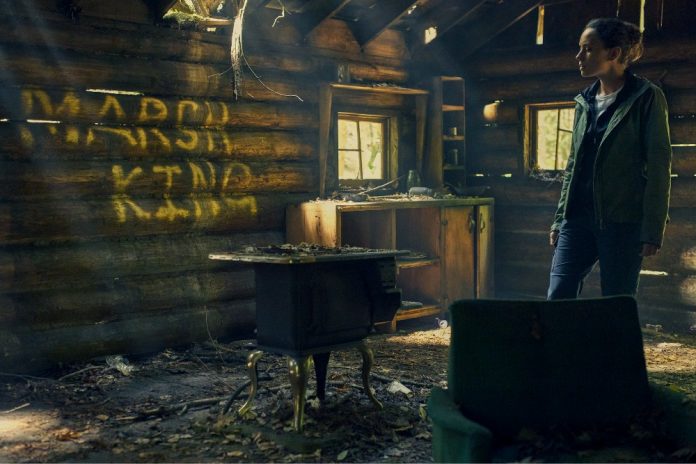Director Neil Burger‘s career has stretched across twenty years with quite a varied filmography that includes The Illusionist, Divergent, Limitless, and more, all very different movies from each other.
Burger’s latest film, The Marsh King’s Daughter – based on the 2017 bestseller by Karen Dionne – stars Daisy Ridley as Helena Pelletier, a woman trying to get her life together after a turbulent childhood living in the wilderness with her hunter father Jacob (Ben Mendelsohn), not realizing that he had abducted her mother (Caren Pistorius) before she was born. In the present day, Jacob has escaped from prison, so Helena has to protect her own daughter and family. The Marsh King’s Daughter also stars Brooklyn Prince as the younger Helena, Garrett Hedlund as her present-day husband, and Gil Birmingham as Clark, her adopted father.
The Marsh King’s Daughter feels like somewhat of a departure for Burger, although as he told Above the Line over Zoom last week, it’s still cut from similar thematic cloth as his earlier films. In the following interview, he tells us about the challenges of making his latest film, which involved a lot of outdoor shoots amidst a pandemic.
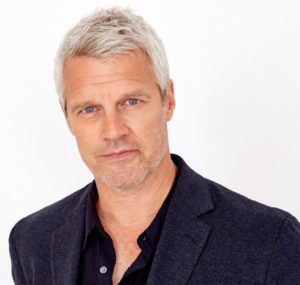
Above the Line: I’ve always enjoyed your filmography, because every movie is so different. I went back to our first interview and my very first question was about how different The Illusionist was from your previous movie. I feel that can be my first question for every movie we talk about.
Neil Burger: They are all different, but for me, there’s kind of an underlying theme that’s interesting to me, which is the idea of personal transformation. Can you change the way you were brought up, the way your parents raised you, whatever traps that were created, can you throw off that shaping that was done, the mold you were put in and become the person you want to be? Can you free yourself? In Limitless, you see that in the sense of he wants to become the best version of himself. In this movie, she has this history of trauma that just completely imprisons her in a way. Can she throw off that trauma? Can she fight that trauma? Can she conquer that trauma? Can she conquer her own personal history, move ahead and free herself, and be her authentic self?
ATL: Was this something that was being developed by the producers before you were brought on board to direct?
Burger: Yes, I got presented a script based on the book, and the script was written, and I liked it. And then Daisy, they had actually been talking to independently, and we sort of came on at the same time. We talked to each other and both wanted to work with each other, so then joined up with the producers.
ATL: What were some of your concerns when you got the script in terms of shooting it? A lot of it is outdoors, obviously, and there is some action.
Burger: Initially, it seemed like a perfect script to be doing. It came to me in the middle of COVID, and I thought, “Great a story that takes place outdoors in the fresh air. What a perfect movie to shoot during COVID.” Which is true to a degree except for the fact that we had COVID testing every single day, and when you’re out in the wilderness, where it was really hard to shoot, and then having to take time off for every single crew member to file through and get tested for COVID, it just made it incredibly more difficult, and everybody still wearing masks, even though you’re outside, and it might have been raining or it was humid, so then the masks are wet. You’re trying to change your masks and be careful. It was a variable that we didn’t need.
ATL: You mentioned some of the similarities between this and other movies you’ve directed, like Limitless…
Burger: Thematically, in characters transforming themselves, wanting to be something that they aren’t or trying to mend themselves in some way. Can you change? You were asking the difference between all my movies, and I think that’s a theme that actually is in every single one of them.
ATL: So that’s what grabbed you when you read the screenplay?
Burger: I think two things: I was interested in shooting a movie that was set in nature, where the wilderness and the natural world was a character in the story. And then I also clicked into this idea of this woman trying to deal with her past and move into her own future, to sort of save herself. I like those stories, and you like the dialogue, you like the events, it all added up. But those were the two overarching things.
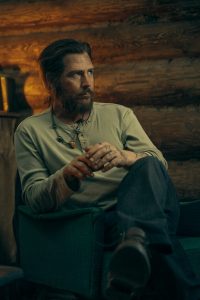
ATL: What about casting Ben Mendelsohn? Ben is just such a wonderful person, but he’s just so good at playing these awful people for some reason.
Burger: No, Ben’s a really warm, gentle, sweet guy, until he gets into character, and then, he’s like a caged animal with a real ferociousness. He drops into it, and he’s quite intimidating when he’s in character, which for me, was perfect. I’m all for it. But he’s a real actors’ actor. He really is giving generously to the other actors. But yeah, look, he has this dark side of him, or this dark place that he can go to that is explosive, and is great for our character. I don’t think we could find anybody that was better for the part, because in the beginning, he’s really empathetic, and you’re compelled by him and like him. That was the whole idea, was that she is devoted to him, the young Helena, as a child. She loves him, she idolizes him, they’re a team, and that’s the image that Helena as an adult, played by Daisy Ridley, that’s what she has in her head the whole time, even though she knows he should be in jail, and all the bad things that he’s done, that’s when she was happiest, when she was with him. It’s confusing and interesting and complicated.
ATL: You mentioned shooting in COVID, but you’re also shooting a lot outdoors, so how did the actors adjust to that? Daisy’s been in Star Wars movies, so she’s probably had everything thrown at her, but what about an even younger actor like Brooklyn Prince?
Burger: Daisy’s been through everything, but this was in a different way. You’re on a Star Wars movie, you’re pretty well taken care of, you’re pretty well protected. In this movie, there were no amenities where we were. We were deliberately in difficult places, and deliberately trying to make it difficult for us and seeing what that could bring to the storytelling and to the acting actually. They were down with it, but you’re always down with it, and then you get there and you’re like, “There’s no toilet? What? Okay.” For somebody like Brooklyn Prince, I mean, she was 10 years old when we did it, and she was so mature, not in like a stage kid kind of way, she just knew who she was. It was incredible actually, and she just rolled with it and was game for anything and everything. I think she was enjoying it and enjoying throwing yourself into this character, as was Daisy and Ben. It was hard. Everybody was tested, but everybody dealt with it.
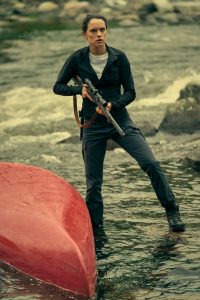
ATL: How do you go about finding locations up in Canada? I imagine you do scouts, but there’s a lot of wilderness up there, and it seems like a lot of places might be hard to find again.
Burger: There is, and obviously with any movie, and particularly in this movie, you obviously take on a location manager that has location scouts, but we’re not looking for offices or restaurants or something like that. I was very specific in what kind of wilderness we were looking for, even around the river where she was going to chase him and where the cabin was going to be and what the marsh should feel like. It was very specific in what should there should be. How tall is the grass and all this stuff? They heard that and then, if they didn’t know where it was themselves, they contacted the people they knew who were outdoors people. We met people that literally lived off the land, who had thoughts about where… who really knew the landscape, the terrain. We just got suggestions and suggestions. People would go out to photograph it. We’d look at the photograph, “Oh, that’s not right. Oh, that’s getting there. If it could be that, but if it could also be this.” “Okay, I think I know where I can find that.” That’s the way it works, I mean, on any movie, but particularly, this one was challenging, because you weren’t like just working in a city or town. You were looking over millions of acres, a whole part of a country.
ATL: I do want to ask about working with your DP Alwin Küchler again, who shot Divergent. What was your approach on this one? There were many amazing shots of the roads and foret with the camera panning around. Do you storyboard a lot?
Burger: The movie is completely storyboarded, which isn’t rigid, but it’s a conversation piece, and it’s a way to explain to other people what you’re thinking of. And then, sometimes you get to the location, and you’re like, “That’s interesting like that, but let’s do it in a completely different way.” I do know Alwin very well. I’d worked with him on long film before it. We talked about doing other things as well. We had a good sort of rapport.
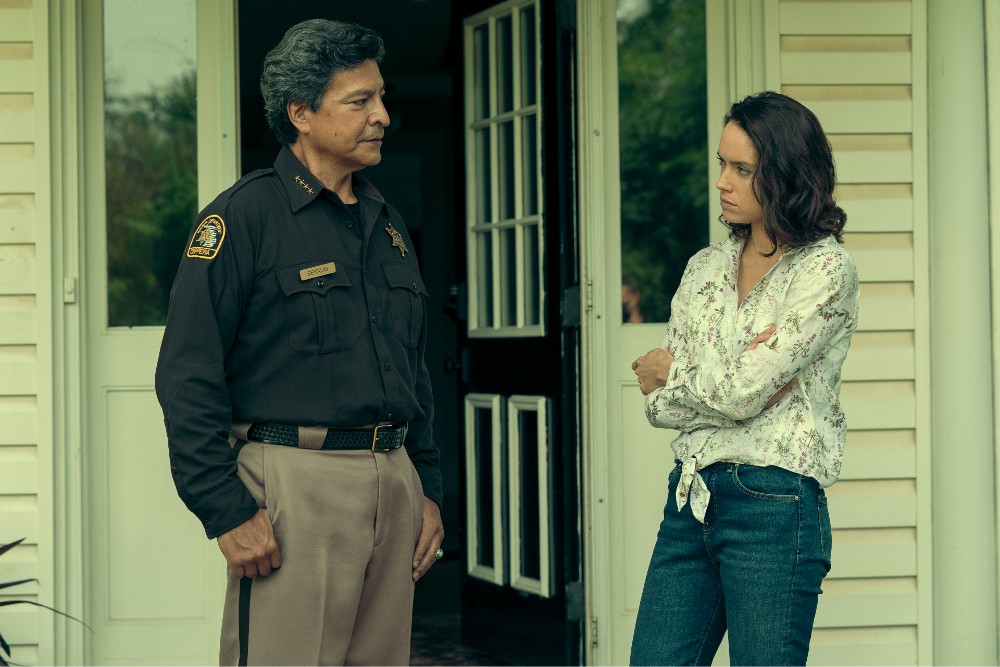
ATL: You also have your editor Naomi Geraghty, who you’ve been working with a long time, which is a bit of a luxury, since a lot of times, good editors get stolen away by other filmmakers as they get busier.
Burger: I’ve had a lot of DPs stolen away, too. It does happen, but Naomi and I have done I think seven movies or something like that. She and I have a real shorthand; we finish each other’s sentences. She is just great, and she’s just so sensitive to performance and to story. It’s just such a luxury, as you said, to have somebody who you can trust, who you’re working with, who, if you get stumped on something, they have an idea. They just understand the material, and they understand the performances, and what’s going to work and what isn’t.
ATL: Do you consider yourself a journeyman director? It’s a term that gets thrown about, and I’m not sure always as a compliment? But to me, a journeyman director is capable of doing anything, which you’ve proven you can do, so do you consider yourself a journeyman?
Burger: I like your interpretation of it. I don’t think it’s a compliment. I think it’s somebody that just does whatever jobs presented to them, but I know what you mean, and I don’t consider myself that. I consider myself as somebody that… everything that I choose I’m choosing; I’m not taking things because they’re offered me. I’m choosing them, because I’m interested in them, and I’m choosing them because I think I can make a great film out of them. Sometimes one’s successful and sometimes one isn’t.
A career is an interesting thing. You might set out to go that way and then things start to go that way, and you find yourself over here and you’re like, “Am I trying to get back to there or am I going to keep going this way?” Sometimes it’s like, “Oh, I had the next movie to go this direction, but we couldn’t get the financing. I also liked this movie, but it’s over here and now it’s like I’m understood as somebody who works over here.” It’s interesting, but I’m lucky to be doing what I’m doing.
ATL: Will you be writing something again?
Burger: I mean, yeah. I’ve actually got three screenplays and two TV shows that are ready to go once these strikes are over, and I have another movie in the can.
The Marsh King’s Daughter opens nationwide on Friday, November 3.


